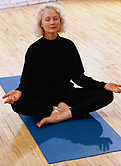- The Best Time of Day to Drink Bone Broth to Maximize Health Benefits
- 8 Ways to Increase Dopamine Naturally
- 7 Best Breads for Maintaining Stable Blood Sugar
- Gelatin vs. Collagen: Which is Best for Skin, Nails, and Joints?
- The Long-Term Effects of Daily Turmeric Supplements on Liver Health
- Could Your Grocery Store Meat Be Causing Recurring UTIs?
- Are You Making This Expensive Thermostat Error This Winter?
- Recognizing the Signs of Hypothyroidism
- 10 Strategies to Overcome Insomnia
- Could Artificial Sweeteners Be Aging the Brain Faster?
Yoga May Help Breast Cancer Patients During Radiation Therapy


Women with breast cancer who practiced yoga had lower levels of stress hormones and reported less fatigue and better quality of life, new research shows.
“Yoga is having an impact on subjective well-being, as well as better regulation of cortisol, a stress hormone,” said study co-author Lorenzo Cohen, director of the integrative medicine program at M.D. Anderson Cancer Center, in Houston. “Better regulation of stress hormones has been linked with better survival and longer survival.”
The study is published in the March 3 online edition of the Journal of Clinical Oncology.
Other research has found yoga helpful for cancer patients, Cohen said, but some of those studies have looked at small numbers of patients and others have not compared the yoga group to a “control” group to measure results.
For the new study, Cohen assigned more than 160 women with breast cancer who were undergoing radiation therapy to do either yoga or stretching up to three times a week for an hour each session. Those two groups were compared to a control group that received no instruction in either yoga or stretching.
The women reported on their quality of life, including how fatigued or depressed they felt, and described their daily functioning. They gave saliva samples at the study’s start, the end of treatment, and at one, three and six months after treatment, so cortisol could be measured.
Women in the yoga group had the greatest reduction in cortisol levels across the day, which reflected the ability of yoga to help regulate stress hormones, the study authors noted.
After finishing radiation treatment, which is linked with fatigue, only the yoga and stretching groups reported feeling less tired, the findings showed. The yoga group had more benefits in physical functioning than the other two groups.
No differences were found between the groups for mental health and sleep quality. That may have been because all the women were doing fairly well on those measures at the study’s start, Cohen said.
Previous studies have linked exercise with better well-being and less fatigue among cancer patients, said Dr. Joanne Mortimer, director of women’s cancer programs and co-director of the breast cancer program at City of Hope Cancer Center in Duarte, Calif.
Recommending exercise to a cancer patient who is already tired may sound counterintuitive, Mortimer said, but research suggests that’s not so.
“This study supports that the more you do, the better off you are,” Mortimer explained.
Cohen put it this way: “I think it’s important for breast cancer patients to engage in some sort of activity to buffer [dealing with the disease].”
Yoga, he said, provides an important mind-body approach to help patients get physical activity, relax and calm their mind.
While yoga class offerings are widespread, Cohen pointed out that “it’s important to find the right kind of yoga teacher. It’s about doing a gentler form of yoga.”
He suggested women with breast cancer ask their doctor first if they can participate in yoga, then find a yoga instructor with experience leading a class that includes cancer patients.
More information
To learn about physical activity and cancer, visit the U.S. National Cancer Institute.
Source: HealthDay
Copyright © 2026 HealthDay. All rights reserved.










